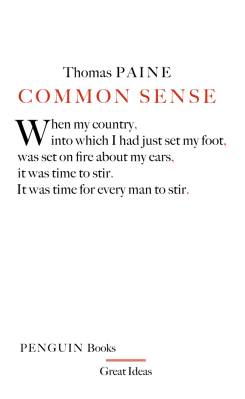 This week, we listened in to Barry Schwartz on "The real crisis? We stopped being wise."
This week, we listened in to Barry Schwartz on "The real crisis? We stopped being wise.".
.
Discussion:
-
Joo Hwa said that what he likes about the talk is that, "Rule number 1, there are no rules"
Someone else continued that there are always rules, but we must use our commonsense to see what is practicable. However, I think that the word "commonsense" is precisely what bureucrats are afraid of. "Commonsense" has to be defined.
.
Here, Ralf brought out the book "Common Sense", written by Thomas Paine in 1776, that set off the American Revolution.
.
Wikipedia defines 'Common Sense" as "...consists of what people in common would agree on: that which they "sense" (in common) as their common natural understanding. "

Jo brought out his experience of handling exceptions in the travel industry in that it can be used as a competitive edge. Customers take delight in having their exceptions well handled.
.
Jn replied that however, exceptions can be tedious to deal with and businesses may not like to end up spending too much time on exceptions which is a lesser occurence.
.
Jn shared her experience of her company's rules on not accepting cash from customers due to past abuse. Jn has a client that works six days a week as a food stall attendant and is too tired to go to the bank to send the money. She doesn't have cheque books and doesn't know enough English to transfer money via the ATM. In view of that, Jn accepted her cash, but ended up being hauled up by her management for breaking the rules. Jn suffered a black mark in her company, but till this day feels that it was worth breaking that rule in that instance as she put the customer first.
.
In my example as an information security policy manager in the past, we accept applications for waiver of certain policies by applications project managers. In it, they will explain why they can't follow certain policies and we will discuss and decide if we approve the waiver. Periodically, we will examine the statistics for the number of application for waivers, the number approved and determine if it is the policy that is not practical. If so, then we change the policy.
.
Jn brought out the example of the mainland Chinese buyer of the two fountain heads of a rat and a rabbit, at the recent Christie's auction, and then refused to pay for them, in order to sabotage the auction. These two fountain figurines were looted by the European occupation forces during the Ching dynasty in China.
.
W had a young employee who on the first day suggested that she can bring her previous clientele to her. W didn't accept to do that as she thought this is not morally correct. However, this is a standard practice in many industries. Private Banks poached senior private bankers just for their clientele. It is such an open secret that it is almost standard practice.
.
It is such a common practice that some people even childed me for being naive and impractical to stick on to some moral values. Unfortunately, some personalities of such exploits and financial successes are amplified by the media as 'heroes'. What we need are more moral heroes, not just money heroes. And this moral heroes can be just ordinary folks.
.
I have an experience with the 'auntie' selling three packs of tissue papers for one dollar at Tampines MRT station. That morning, I had only ninety cents of change and decided to just give the money to her. She refused and insisted that I take the tissue paper. I told her I couldn't do that as I had only ninety cents and not one dollar. Then she insisted that I take at least 2 packs of the tissue paper. I think she is a moral hero. Despite her visible abject poverty, she would refuse to accept charity and free money.
.
Jacy also brought up an example of someone who advised her to park her car at the higher floors instead of the more danger prone lower floors. He doesn't have to do that, but did that as his moral responsibility. That too, is a morally heroic act.
.
To round it up, I would say that as Dr Aaron have said, if we put Love first, the things will naturally falls into place. When we put Love first, we will know which rule to break or not to break.
.
Exercise: Can you share about your experience with a moral hero or someone you know of that who is fit to be one? Send them in as a comment. Let's start the ball rolling of recognising moral heroes.
.
.
.jpg)














2 comments:
Common sense is not the same as wisdom or being wise... some people use 'common sense' to justify uswise decisions.. Take the case of the guy who used 'common sense' to dash across the express way - an act that caused injury and death to others.
That guy who dashed across the Pan-Island Expressway in Singapore was drunk! Probably had his commonsense suppressed! :)
Post a Comment